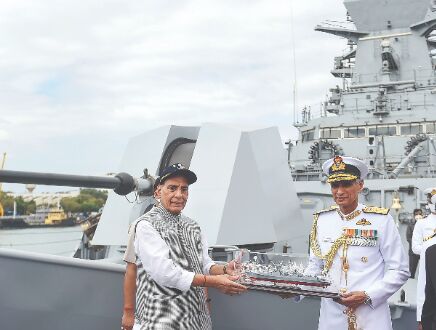Rajnath: Irresponsible nations twisting definition of UNCLOS

Mumbai: Taking a veiled dig at China, Defence Minister Rajnath Singh on Sunday said "some irresponsible nations" for the sake of their narrow partisan interests and hegemonic tendencies are coming up with inappropriate interpretations of the UN Convention on the Law of the Sea (UNCLOS).
It is a matter of concern that UNCLOS is being repeatedly weakened by arbitrary interpretation of its definition by some nations, Singh said, after commissioning of Indian Navy's destroyer Visakhapatnam here.
As a responsible maritime stakeholder, India supports consensus-based principles and a peaceful, open, rule-based stable maritime order, Singh said. India envisions a rule-based Indo-Pacific, with freedom of navigation, free trade and universal values, in which the interests of all the participating countries are protected, he added. Singh underscored the importance of a rule-based freedom of navigation and security of sea lanes in the present era of globalisation to ensure stability, economic progress and development of the world. The UNCLOS 1982 specifies about any country's territorial waters, exclusive economic zone and good order at sea, he said. The arbitrary interpretations create obstacles in the path of a rule-based maritime order, he said. There are some nations - I would like to say irresponsible nations (who) for the sake of their narrow partisan interests, keep on giving new and inappropriate interpretations to these international laws from hegemonic tendencies, Singh said without naming China.
China has been militarizing islands in South China, a move that has attracted global criticism.
The area has overlapping claims of several East and Southeast Asian nations.
In 2016, an international tribunal rejected China's argument that it enjoys historic rights over most of the South China Sea -- a region known to be rich in hydrocarbons and also hosting an important Sea Lane of Communication.
Following the order, China said the award is "null and void and has no binding force" and it neither accepts nor recognises it.
Noting that the Indo-Pacific is important for the whole world, Singh said the region sees passage of two-third oil shipments of the world, one-third of the bulk cargo and more than half of container traffic. Singh said as an important country in the region, the Indian Navy's role assumes a more crucial role for the region's security.
It becomes the primary objective of the Indian Navy to keep the Indo-Pacific open, safe and secure, he said. Singh asserted that India's interests are directly linked with the Indian Ocean and the region is crucial for the world economy.
Challenges such as piracy, terrorism, illegal smuggling of arms and narcotics, human trafficking, illegal fishing and damage to the environment are equally responsible for affecting the maritime domain. Therefore, the role of the Indian Navy becomes very important in the entire Indo-Pacific region, he added.
Countries world over are working towards making their military power strong and modern due to global security reasons, border disputes and importance to maintain maritime dominance, he said.



